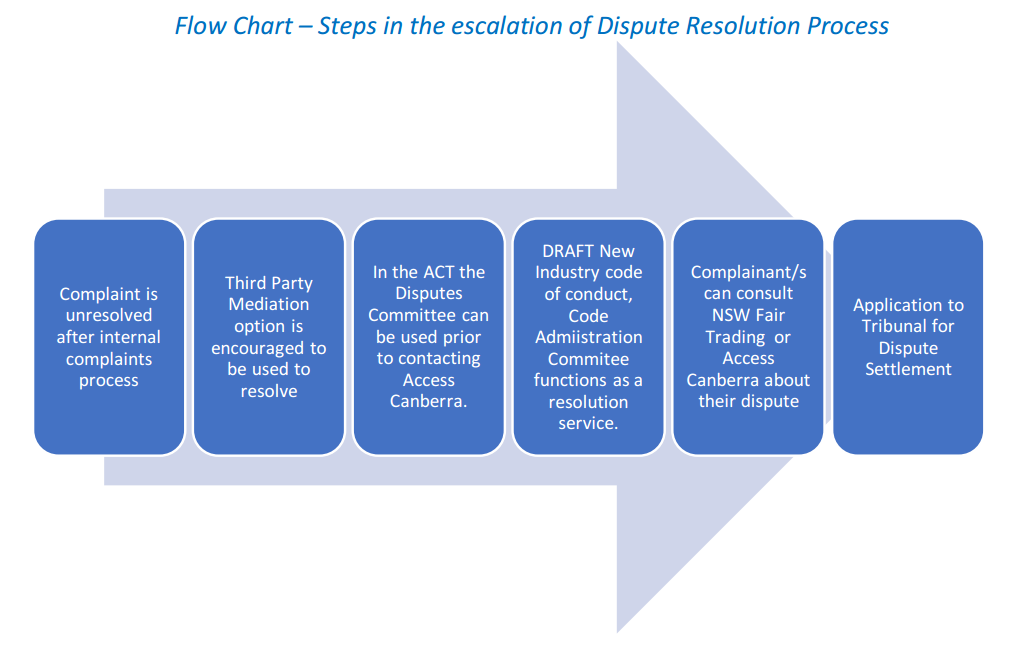RSL LifeCare is committed to promoting a culture that values complaints and their effective resolution. The purpose of the Disputes Resolution Policy and Procedure is to ensure that RSL LifeCare team members undertake a transparent process in the resolution of a complaint where other internal efforts to resolve the issue have not been successful.
- Purpose
The purpose of the Disputes Resolution policy and procedure is to ensure that RSL LifeCare, Retirement Living staff undertake a transparent process in the resolution of a complaint where other internal efforts to resolve the issue have not been successful.
RSL LifeCare Retirement Living ensures that third party avenues are cost effective and in a manner that is fair and reasonable to all parties involved.When the resolution of a complaint is unsuccessful, and the complainant/s remain dissatisfied, the complainant/s are guided through the dispute’s resolution process and provided other options and avenues to resolve the complaint. All appropriate steps are taken to support the complainant/s to resolve the dispute.
- Scope
RSL LifeCare Retirement Living has differentiated the terms ‘Complaints Handling and Resolution’and ‘Dispute Resolution’ to ensure that the process clearly articulates an escalation from an internal complaints handling process to an external dispute resolution process.
This policy applies to all RSL LifeCare staff in the handling and resolution of disputes in relation to Retirement Living.
All resident-facing staff will have an understanding of the Dispute Resolution policy and procedure to guide residents in the process.
Staff involved in the cascading internal escalation process for managing complaints includes the Village Manager, the Regional Manager and the Executive Manager Retirement Living.
- Policy Statement
Reflecting the principles of natural justice, openness and procedural fairness, the RSL LifeCare Retirement Living Dispute Resolution policy and procedure will encourage a positive complaint culture to ensure continuous quality improvement.
- Roles and Responsibilities
All staff are responsible for:
- Being aware and complying to the Dispute Resolution policy and the procedure.
- Report and provide feedback to management on issues arising from complaints and
disputes - Provide suggestions to management on ways to improve the organisation’s complaints
management system in the aim to proactively avoid a complaint escalating to a dispute. - Implement changes arising from the learnings of individual disputes
Senior Management is responsible for;
- Providing adequate training support and direction to key staff responsible for dispute
resolution. - Review and report on any arising disputes internally and externally as required.
- Escalating disputes to the Executive General Manager Retirement Living and to legal counsel
as required. - Understand contributing factors that may have led to the dispute and implement changes for
improvement, arising from the learnings of individual disputes. - In the ACT, management are responsible for the implementation of the Disputes Committee.
- Guiding Principles
- The first step for any issue or problem is to encourage the complainant/s to talk with us as the village operator to settle differences and seek a resolution. See Complaint Handling and Resolution Policy – Retirement Living.
- Information is provided about the use of an independent third party and is encouraged to assist in the resolution of a dispute prior to escalating to the dispute to the relevant Fair- Trading body and Civil and Administrative Tribunal.
- All disputes are handled in a non-judgemental environment where there is no cause for any participant to fear retribution by being engaged in the disputes process. Residents are supported to exercise their fundamental right to complain without consequence.
- Key Points for Compliance - Retirement Villages Act Part 8
In NSW and ACT; If a resident/s or the operator of a village claims that a dispute has arisen the resident or operator may apply to the tribunal for an order in respect of the dispute.
The Retirement Villages Act ACT allows resolution of disputes through mutually agreeable ways for both involved parties. A Disputes Resolution Committee must be established in all Retirement Living villages in the ACT; consisting of a member appointed by the residents, a member appointed by the operator and a mutually agreed upon independent chair. Within 30 days of receiving notice of a dispute the Disputes Resolution Committee must resolve the dispute or arrange for mediation. If the dispute is unresolved, then the dispute may then be referred to ACT Civil Administrative Tribunal (ACAT). Operators and residents may independently choose to go directly to ACAT or seek outside mediation. Use of the Disputes Resolution Committee is not compulsory.
Under the Act, costs of establishing and maintaining a Disputes Committee must be funded by the recurrent charges of the village.
The Retirement Villages Act NSW allows operators to establish mechanisms for attempting to resolve disputes in the village.
- Related Documents and References: (Internal and external)
- Complaint Handling and Resolution Policy- Retirement Living
- Complaints Risk Register/ ERMS
- Retirement Village Law in NSW Richard McCullagh 2013
- www.accesscanberra.act.gov.au – Retirement villages responsibilities and guidance material
- www.fairtrading.nsw.gov.au/__data/assets/pdf_file/0005/367943/FT011_Retirement_Villag
e_Living.pdf – Resolving Disputes Pg. 29 - Retirement Villages Act 1999 No 81 NSW
- Retirement Villages Regulation 2017 NSW
- Retirement Villages Act 2012 ACT
- Retirement Villages Regulation 2013 ACT
- Retirement Living Code of Conduct December 2018
- Draft ARVAS Standards 2019
- RSL LifeCare Complaints Form
- NSW Fair Trading Dispute Details form https://www.cas.fairtrading.nsw.gov.au/icmspublicweb/forms/Tenancy.html
- Retirement Living Code of Conduct December 2018
- NSW Ombudsman Managing unreasonable complainant conduct practice Manual May 2012
- Civil and Administrative Tribunal Rules 2014
- Compliance, Monitoring and Evaluation
- Annual Quality Management Systems Internal Audit
- Monthly reporting on disputes, analysis and evaluation of complaints management system
- Definitions and Terminology
- Dispute an unresolved complaint escalated either within or outside of our organisation.
- Complaint, as defined in the Australian and New Zealand Standard Guidelines for complaint management in organizations (AS/NZS 10002:2014), are “expressions of dissatisfaction made to or about an organisation related to its products, services, staff or the handling of a complaint, where a response or resolution is explicitly or implicitly expected or legally required.
- A complaint covered by Complaint Handling and Resolution Policy- Retirement Living policy
can be distinguished from:
a. staff grievances
b. resident to resident grievances
c. responses to requests for feedback about the standard of our service provision (see the
definition of ‘feedback’ below)d. reports of problems or wrongdoing merely intended to bring a problem to our notice
with no expectation of a response (see definition of ‘feedback’)e. requests for information (see our access to information policy).
f. Complainant A complainant is a person making a complaint and, in this policy, has escalated to a dispute. The term refers collectively to residents and their family, as well as representatives and members of the public. It does not include staff in this scope.
g. Unreasonable Complainant Conduct: any behaviour by a current or former complainant which, because of its nature or frequency, raises substantial health, safety, resource or equity issues for the parties to a complaint. (NSW Ombudsman)
- Escalating an unresolved Internal Complaint to an External Dispute Resolution process. Tier 3

- Where a complaint has not been able to be resolved within the internal complaint management process, the complaint hander will escalate the compliant to a Tier 3 category External Dispute, see Tier categories in Complaint Handling and Resolution Policy- Retirement Living.
- The escalation pathway will involve the following stakeholders:
a. The Village Manager (if agreed by the resident);
b. A supervisory manager, e.g. The Regional Manager;
c. An Executive Manager who does not manage the Retirement Community. - The seniority of the allocated manager to handle the dispute is relative to the severity of the dispute and to avoid any conflict of interest.
- When determining how the dispute will be managed, the allocated senior manager will assess the background and factors that have led to the dispute. The level of risk will be assessed using the following criteria:
a. how serious, complicated or urgent the dispute is.
b. review whether RSL LifeCare has handled the complaint effectively to date and
assess whether the complaint could have been resolved through other avenues before escalating to an external dispute.
c. Complainant/s, and staff safety and wellbeing as a result of the unresolved
complaint.
d. the risks involved if resolution of the dispute is delayed.
e. assess evidence of unreasonable complainant conduct;
f. determine if legal counsel is required.
- Managing and documenting the dispute
- Once the dispute has been assessed, the senior manager is responsible for discussing the current situation with the complainant/s, identifying what is important and re-clarifying the outcome that the complainant/s seeks. Information about the disputes process is provided and further opportunity to resolve internally is also explored.
- The complainant is informed they are entitled to invite or appoint a representative to act on
their behalf. RSL LifeCare will respect and cooperate with the resident’s appointed representative in the same fashion as dealing directly with the resident. - The senior manager will initially encourage the complainant/s to participate in an independent
third-party mediation process and offer to organise this with a mediator such as the Community Justice Centres (CJC) in NSW or in the ACT, the Conflict Resolution Service (CRS). Once agreed the senior manager will organise for a mediation process to occur within 2 working days. - Where the complainant/s refuses mediation or is not satisfied with the resolution from the
mediation process, the senior manager will provide contact information about NSW Fair Trading/ Access Canberra to aid the person in seeking further determination. These will include other useful contacts such as advocates, legal advisors, senior rights services etc. - Where a complainant/s makes an application for an order to the NSW/ACT Civil and
Administrative Tribunal for non-compliance to the Retirement Village Act, the senior manager is required to contact the legal counsel and notify Executive Management immediately. - The allocated senior manager remains in contact with the complainant/s (unless otherwise
advised by relevant bodies) to provide or receive any updates to any actions that are required as a result of the mediation or tribunal process. - Once actions have been implemented or the matter has been settled, the allocated senior
manager should follow up with the complainant/s. Once the matter has been resolved/settled the allocated senior manager updates the complaints register to close the matter. (ERMS) - All records of all conversations are kept in the complaint/ risk management system. All entries will be chronological and detail the progress of the dispute resolution process, the actions implemented, follow up and closing of the matter.
- Accountability & continuous quality Improvement
- Senior management will ensure that disputes are recorded in a systematic way. Analysis and evaluation of regular reports are undertaken monthly regarding;
a. the number of disputes
b. the outcome of disputes
c. issues arising from disputes
d. systemic issues identified - Analysis of these reports will be undertaken to monitor trends, measure the quality of our
customer service and make improvements. - Reports and their analysis will be provided to the Executive General Manager, Retirement Living within the Retirement Living Performance Report.
- Senior management will ensure that disputes are recorded in a systematic way. Analysis and evaluation of regular reports are undertaken monthly regarding;
Download a brochure
We'll never share your email address and you can opt out at any time, we promise


